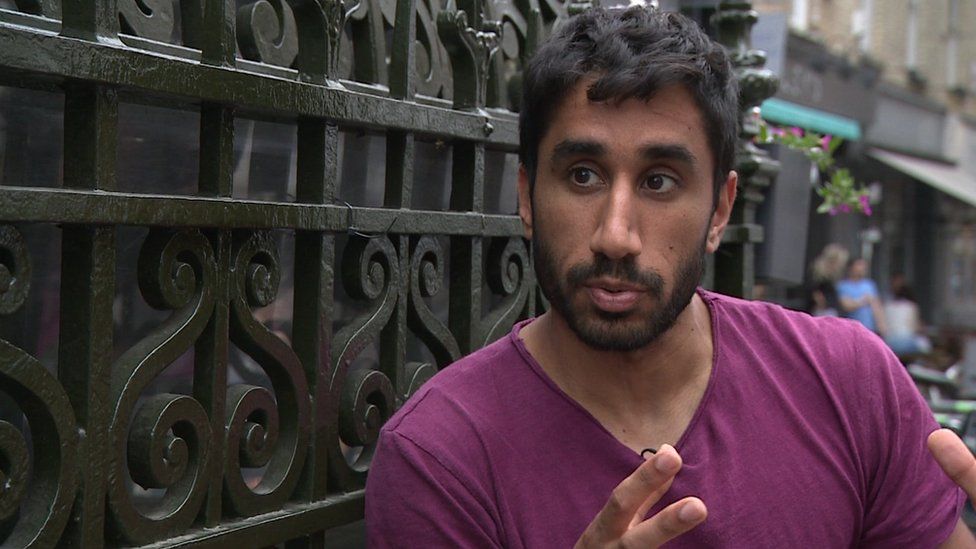Hospital A&E doctor shifts unstaffed
- Published

Dr Amar Mashru says missing doctors can put serious pressure on A&Es
At least 8,000 doctors shifts were left uncovered in London's accident and emergency departments last year, research has shown.
An A&E doctor told the BBC staff were leaving emergency medicine due to the pressures of understaffed departments.
The Department of Health said the number of emergency medicine consultants had increased since 2010.
But the British Medical Association (BMA) warned care can be compromised when doctors are overstretched.
Amar Mashru, an A&E doctor in London, said: "This is something that happens commonly and is something A&E doctors are very used to; coming on to shift and realising that that day's staffing is not filled."
He said a lack of adequate staffing meant doctors were not able to give patients the service they would want to.
In one case, he said, a senior doctor on a night shift did not have the junior support required and was called away to treat two seriously ill patients in the resuscitation area, but when he returned to the main department he discovered a deteriorating patient had died.
"We all know in our selves what good quality care looks like and if you don't have the staffing to deliver it you cannot deliver it", Dr Mashru said.
'Let patients down'
Although he worked in a department where staffing levels allowed him to properly recover from busy periods, Dr Mashru said doctors in understaffed departments were not so lucky.
"Imagine that's your reality every single shift, which for some departments that are really understaffed it is, that physical exhaustion and that sense of a lack of job satisfaction, and the feeling you've let your patients down, eventually it will completely destroy your ability to go back to work.
"Unfortunately we are seeing staff no longer returning to departments and no longer returning to emergency medicine because of the toll it has taken on their own health and wellbeing."
The largest number of unfilled shifts was recorded at the Barking, Havering and Redbridge Trust which had 3,540, according to a Freedom of Information (FOI) request.
Lewisham and Greenwich Trust recorded 979 unfilled shifts last year, whilst Croydon Trust recorded 782 shifts not filled.
Only 11 of London's 18 acute trusts were able to give the BBC figures and some hospitals could not provide figures for the last months of the financial year, so the overall number of missing shifts is likely to be higher.
Dr Jeeves Wijesuriya of the BMA said where doctors are overstretched care could be compromised
Dr Jeeves Wijesuriya, chair of the BMA's junior doctor's committee, said these missing shifts were part of an A&E recruitment crisis facing the NHS.
"This is symptomatic of a problem we've said has existed for some time, and is not just true in London but nationwide," he said.
"We are seeing increasingly a recruitment and retention crisis worsening due to poor long term workforce planning and because of the realities of poor working practice."
He said doctors who had left NHS training jobs told the BMA they were leaving due to a lack of work flexibility, feeling burnt out covering gaps, and the limited training opportunities due to pressure on the system.
Figures from a recent BMA survey of 1,000 doctors found 68% had been asked to act up into more senior roles or cover for more junior colleagues, while 65% said medical trainees at their trusts were pressured to take on extra shifts.
Shelagh Smith, Chief Operating Officer at Barking, Havering and Redbridge University Hospitals NHS Trust, said: "We review every shift by monitoring the situation on a daily and weekly basis to ensure that as many as possible are filled by our staff, or bank or agency staff if required.
"Our top priority is patient safety and we believe that we run a safe emergency department.
"We are trying to be innovative and creative in how we tackle the challenge."
A Department of Health and Social Care spokesperson said: "There are over 750 extra consultants working in emergency medicine since 2010, and we recently announced the biggest ever increase in doctor training places to get even more into our hospitals."
"As part of our long term plan for the NHS, we also recently increasing funding by an average 3.4% a year - meaning that by 2023/24 it will receive £20.5bn a year more than it currently does."
- Published14 June 2018
- Published21 February 2018
- Published29 September 2017